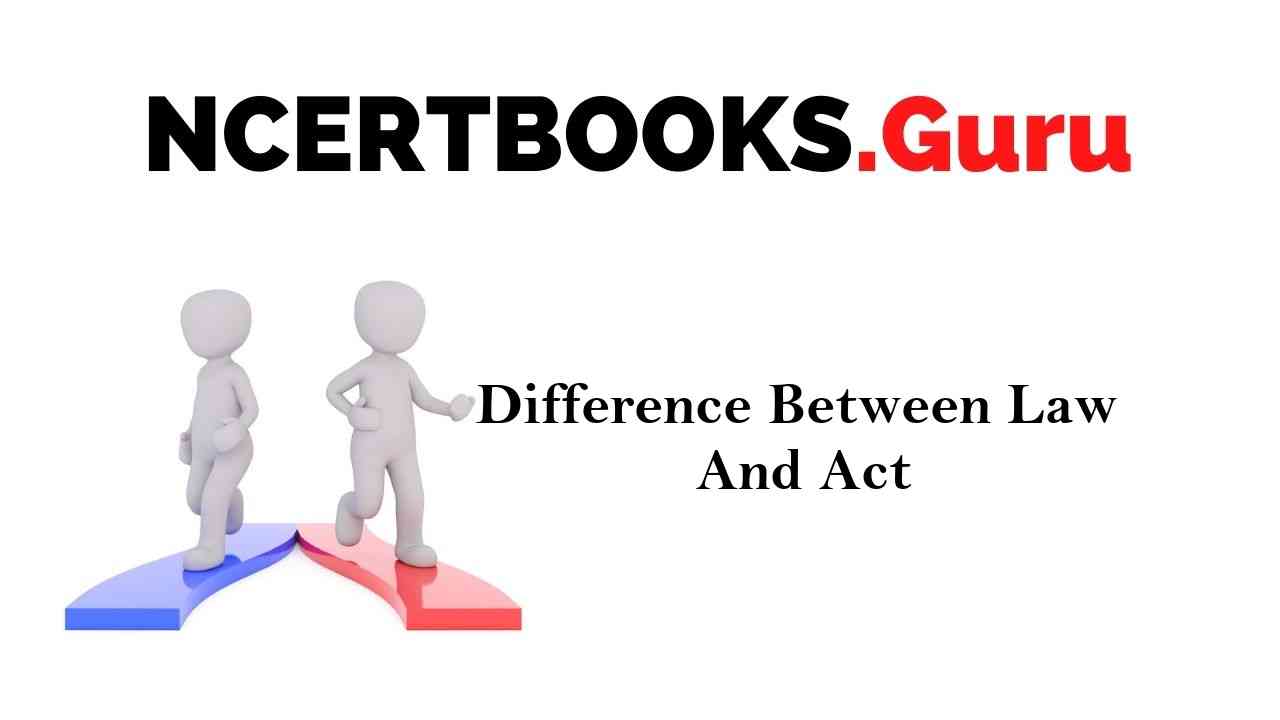Difference Between Law And Act: The terms’ Law’ and ‘Act’ have certain and specific similarities that are often collided interchangeably at times. However, the two terminologies’ key differences differ between act and Law, as the former is a subset of the latter.
You can also find differences between articles on various topics that you need to know. Just tap on the quick link available and get to know the basic differences between them.
What are the Differences Between Law and Act With their Detailed Comparisons
Law is a set of regulations and rules that the Government enforces and is recognised by the country and regulates the citizens’ actions through a system of rules. Contrarily, an Act is a division of Legislation that deals with people and specific circumstances and is passed by the Legislative.
The topic- Difference Between Law And Act is an important subject as it highlights the clear distinctions between the Law and an Act. To better comprehend the topic, let us understand the difference in a detailed manner.
Define Law
Law is defined as the system or a body of rules created and imposed through Governmental or social institutions to oversee, regulate, and maintain the individuals living in society. Law has the sovereign’s authority, and any deviation by certain groups or individuals from the Law could lead to offence or punishment.
Define Act
The term ‘Act’ is defined as the Bill passed through various Legislative steps to develop and become an enforced Law. In India, an Act is a statute that must be passed by both the Houses of the Parliament -Lok Sabha and Rajya Sabha to be deemed operative and functioning. This process is known as Primary Legislation. There are several Acts in India dealing in various aspects of the Law. A few of the Acts are substantive while some are procedural, while some can fall under the private or public category.
Difference Between Law And Act
| Law | Act |
| Law is defined as an assemblage of regulations and rules which must be followed as they remain indispensable. | An Act is a decree which is approved by the respective legislature. In India, an Act is approved by the State Legislative Assembly or the Parliament of India. |
| Law is more generic in terms of operations, and the system is not that intricated to comprehend. | Depending on the applied domains, Acts are specific and conditional. |
| Law is an established phenomenon. | An Act is originally a bill proposed by the Parliament or the Houses of the Parliament. The Bill then gets approval from the Lok Sabha and Rajya Sabha and finally, the President approves the stature and then functions as an Act. |
| A law is implemented to end malpractices, maintain public order, and most significantly protect the Fundamental Rights. | Acts are billed and implemented to ensure that people remain aware of a certain system of rules and regulations that are in place. |
| Law mainly holds the single purview over the larger picture. | An Act is a subset of the Law itself. |
| Law is established by the regulatory procedure and therefore, can be enforced. | An Act is used as a representation by the Bill; it is passed for and will not be enforced until the Bill becomes a law. |
| Law ensures that people strictly abide by the defined set of rules and regulations. | An Act is employed in certain specific situations to establish the system of regulations and rules in specific domains. An example of this is the Indian Companies Act, which regulates companies or corporations’ formation and functioning in India. |
| Laws fall under the regulation by the Government authority and hold sovereignty in it. | Acts are provisions that are enacted by the Legislative Body or the Government for the people to understand the meaning and role of the Acts in specific circumstances. |
